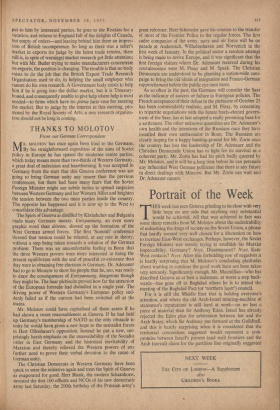THANKS TO MOLOTOV
From our German Correspondent MR. MOLOTOV has once again been kind to the Germans. By his straightforward exposition of the aims of Soviet policy in Europe he has spared the moderate centre parties, which today mewls more than two-thirds of Western Germany, a great deal of indecision and heartburning. It was accepted in Germany from the start that this Geneva conference was not going to bring German unity any nearer than the previous conferences, but there had been many fears that the Soviet Foreign Minister might use subtle tactics to spread suspicion between Western Germany and her Western Allies and heighten the tension between the two Main parties inside the country. The opposite has happened and it is now up to the West to consolidate this advantage.
The Spirit of Geneva as distilled by Khrushchev and Bulganin made many Germans uneasy. Entspannung, an even more graphic word than détente, slowed up the formation of the West German armed forces. The first 'Summit' conference showed that tension could be relaxed, at any rate in theory, without a step being taken towards a solution of the German problem. There was an uncomfortable feeling in Bonn that the three Western powers were more interested in fixing the present equilibrium with the seal of peaceful co-existence than they were in obtaining free elections in Germany. Dr. Adenauer had to go to Moscow to show his people that he, too, was ready to draw the consequences of Entspannung, dangerous though they might be. The Saar plebiscite proved how far the attraction of the European formuhe had dwindled in a single year. The driving power of Western Germany's European policy sud- denly failed as if the current had been switched off at the mains.
Mr. Molotov could have capitalised all these assets if he had shown a sweet reasonableness at Geneva. If he had held up Germany's membership of NATO as the only obstacle to unity he would have given a new hope to the neutralist forces in Herr 011enhauer's opposition. Instead he put a new, sur- prisingly harsh emphasis on the unassailability of the Socialist order in East Germany and the historical inevitability of Marxism and thereby relieved the Western powers of any further need to prove their verbal devotion to the cause of German unity.
The Christian Democrats in Western Germany have been quick to seize the initiative again and treat the Spirit of Geneva as evaporated for good. Herr Blank, the modern Scharnhorst, invested the first 100 officers and NCOs of his new democratic army last Saturday, the 200th birthday of the Prussian army's great reformer. Herr Schroeder gave his consent to the transfer of most of the Frontier Police to the regular forces. The first cadre companies of the army, navy and air force will be on parade at Andernach, Wilhelmshaven and Nforvenich in the first week of January. In the political sector a resolute attempt is being made to revive Europe, and it was significantthat the first foreign visitors whom Dr. Adenauer received during his convalescence were M. Pinay and M. Spaak. The Christian Democrats are understood to be planning a nation-wide cam- paign to bring the old ideals of integration and Franco-German rapprochement before the public eye once more.
As so often in the past, the Germans will consider the Saar as the indicator of success or failure in European policies. The French acceptance of their defeat in the plebiscite of October 23 has been commendably realistic, and M. Pinay, by consenting to tripartite negotiations with the future freely-elected govern- ment of the Saar, has at last adopted a really promising base for a settlement. The other unknown quantities are Dr. Adenauer's own health and the intentions of the Russians once they have installed their own ambassador in Bonn. The Russians are clearly hoping for a happy hunting-ground for Mr. Zorin once the country has lost the leadership of Dr. Adenauer and the Christian Democratic Union has to fight for its survival as a coherent party. Mr. Zorin has had his pitch badly queered by Mr. Molotov, and it will be a long time before he can persuade any influential West German politician that there is any future in direct dealings with Moscow. But Mr. Zorin can wait and Dr. Adenauer cannot.










































































 Previous page
Previous page